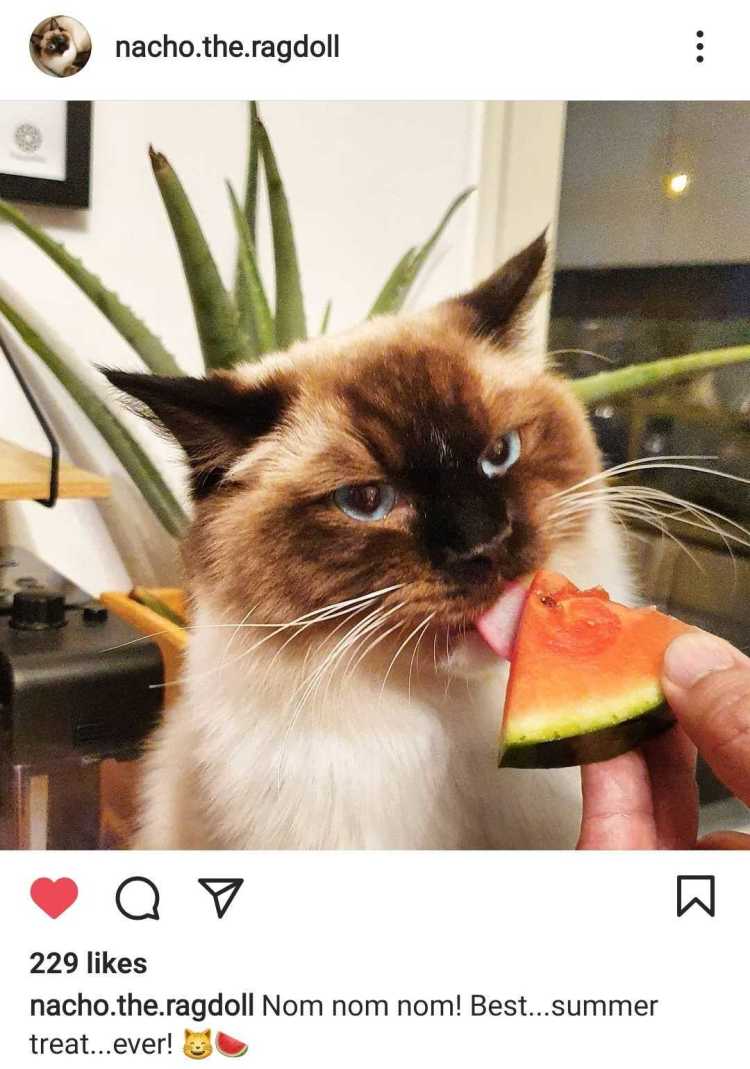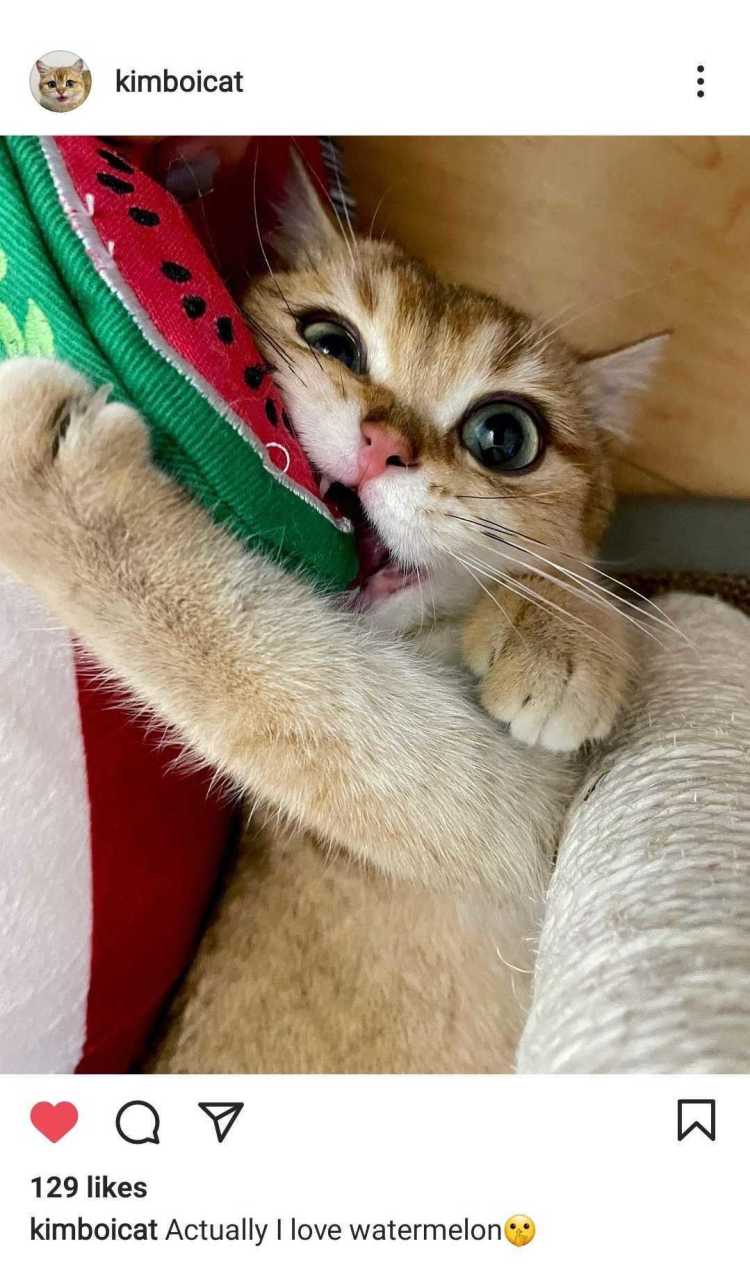Watermelon is a healthy treat for humans and dogs can eat watermelon, too. But what about our feline friends, is it safe for them to consume as well? The quick answer is yes, cats can have watermelon. It’s generally considered safe for them to eat, however, there are a few precautions pet parents should take before serving this fruit to their companions at home.
We’ll go over all the essential information you need to know about how this fruit fits into feline diets, so your cat can safely eat watermelon if you choose to offer it.
Table of Contents:
- Is watermelon healthy for cats to eat?
- When is watermelon bad for cats?
- Can diabetic cats eat watermelon?
- Can cats eat watermelon rind?
- Can cats eat watermelon seeds?
- What about frozen watermelon?
- Can kittens eat watermelon?
- How to safely feed watermelon to cats
- What fruits can cats eat?
- What are healthy treats for cats?
- Key Takeaways
💡 Pro Tip: Pet insurance can be a great way to protect your bank account if your feline friend gets ill by accidentally eating something toxic to cats. For a small monthly fee, policyholders can be reimbursed up to 100% for covered veterinary expenses once they’ve met their annual deductible.
Is watermelon healthy for cats to eat?
Watermelon is full of nutrients, including vitamins A, C, B1, and B6, as well as potassium, magnesium, biotin, antioxidants, protein, fatty acids, and carotenoids. It’s also rich in dietary fiber and very low in calories (1 cup = 46 cal).
Lycopene, the compound that gives watermelon its vibrant red color, offers additional health benefits, such as decreased blood pressure and the prevention of cardiovascular disease. The fruit is made up of 92% water, which also makes it very hydrating and especially refreshing on hot days.
That being said, cats don’t share the same nutrient requirements as humans. For instance, watermelon is quite high in carbohydrates and cats don't have an essential need for dietary carbohydrates.
So, while some felines might find watermelon to be an excellent way to consume their water, as obligate carnivores, they have a higher protein requirement than many other mammals and must eat accordingly. As long as your cat maintains a balanced, nutritional diet, there is no need for them to eat watermelon, and doing so too often could possibly lead to adverse effects.

When is watermelon bad for cats?
Although watermelon isn’t toxic to felines, there are some precautions you should take before serving it to your four-legged friend.
Human foods like watermelon should only be given occasionally and in moderate amounts. Some cats are not as tolerant of human foods as others. If you are feeding a cat watermelon for the first time, be sure to keep an eye on them afterward, as they may develop digestive issues like diarrhea, vomiting, indigestion, or constipation. Cats that react negatively to watermelon might be allergic and you should stop feeding them the fruit immediately.
Can diabetic cats eat watermelon?
Cats with diabetes should not eat watermelon, as it’s very high in natural sugar (1 cup = 9.5 g of sugar). This can worsen diabetic conditions, or lead to digestive issues, weight gain, and obesity.
Feline diabetes symptoms include lack of appetite, excessive thirst, vomiting, constant urination, and the inability to jump. If you notice these clinical signs, be sure to contact your vet to establish a safe diet.
Can cats eat watermelon rind?
Any nutritional benefits of watermelon for cats are found in the flesh, not in the rind. The rind can also be difficult for cats to chew and digest, and can cause choking, intestinal blockages, or stomach upset. For these reasons, it is best to remove the rind before feeding watermelon to your feline companion.
Can cats eat watermelon seeds?
Similar to the danger of pets eating apple seeds, watermelon seeds contain cyanide, a substance that can be very dangerous for cats. While the amount of cyanide in one to two seeds isn’t enough to negatively affect humans, cats have much smaller and more delicate digestive systems. The seeds can also be a choking hazard, especially for small cat breeds, so keep a close eye upon feeding.
💡 Pro Tip: Unforeseen illnesses and random accidents can occur at any time, but that’s when the value of pet insurance can step in to protect your pet and your bank account. Depending on the plan you choose, you can get reimbursed for up to 100% of veterinary expenses once you’ve met your deductible.
What about frozen watermelon?
Frozen watermelon is fine for cats as long as the rind and seeds have been removed. It still contains sugar, though, so be sure to serve it in moderate amounts.

Can kittens eat watermelon?
Similar to mature cats, kittens can eat watermelon as an occasional treat. However, bear in mind that this fruit doesn’t offer much nutritional value to felines, and it’s high in calories and sugar that can be bad for kittens. They’re also more prone to choking on the seeds.
Knowing this, it may be better to stick to other kitten-safe. If your little one doesn’t like to drink water, consider feeding them wet kitten food.
How to safely feed watermelon to cats
If you decide to feed your cat watermelon, be sure to wash the fruit with water first. Cut a section into bite-sized pieces and remove the rind and seeds to avoid gastrointestinal (GI) upset.
Introduce watermelon into your cat’s diet slowly and watch for signs of GI issues, such as diarrhea and vomiting. If you believe your cat is having an adverse reaction to watermelon, contact your vet.
Remember that treats should not make up a significant portion of your cat’s daily intake.
What fruits can cats eat?
Many cats like watermelon, which can’t be said for other fruits. All fruits contain natural sugar and should be fed in moderate quantities, but there are certain fruits that kitties should stay away from.
Citrus fruits contain citric acid, which can negatively impact your pet's central nervous system if given in large quantities and may cause stomach upset even in small amounts. They should also avoid coconut and coconut oil, which can cause a stomach upset, as well as raisins, grapes, and currants because they are all toxic to cats.
What are healthy treats for cats?
If you’re looking for healthy cat treats, consider veggies. Although not all cats will like them, vegetables can be a great nutritional addition to your cat’s diet.
The list of vegetables cats can eat includes celery, zucchini, green bell peppers, carrots, peas, spinach, broccoli, and pumpkin.
Don’t forget that cats are carnivores and while it can be fun to introduce new foods from time to time, replacing full meals with vegetables will cause them to miss out on essential nutrients found in properly formulated cat food.
Key Takeaways
- Cats can eat watermelon safely after the rind and seeds have been removed.
- Be sure to serve this fruit on occasion and in small pieces to avoid choking hazards and weight gain.
- It’s always best to consult your vet before introducing new foods into your cat’s diet.
